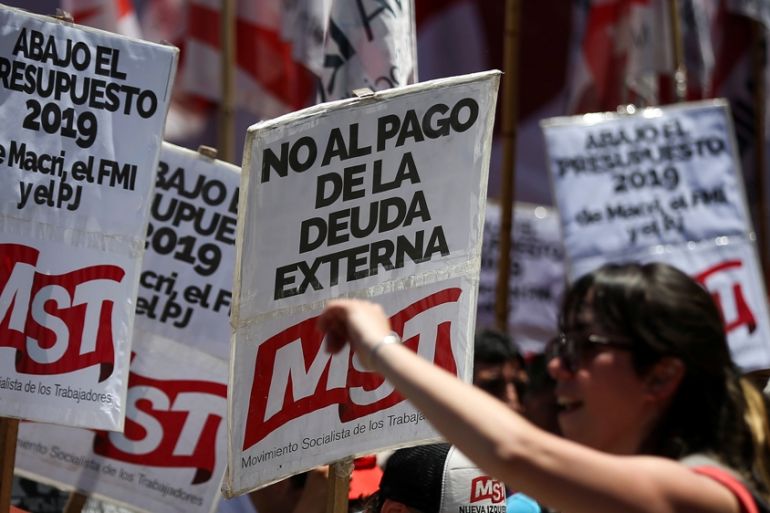Argentina’s Senate passes new austerity budget
Argentine politicians pass austerity budget for 2019 that cuts social spending and raises debt payments.

Argentina‘s Senate approved an austerity budget for 2019 on Thursday that cuts social spending and raises debt payments to meet the stiff requirements of a $56bn International Monetary Fund bailout.
The budget projects a 0.5 percent slide in the gross domestic product and a 23 percent inflation rate by year-end, down from 44 percent this year.
Keep reading
list of 4 itemsIndia’s income inequality widens, should wealth be redistributed?
Facebook, Instagram face EU scrutiny over addictive effects on children
Who benefits from US tariffs on Chinese imports? Experts weigh in
The proposal passed the Senate with 45 votes in favour to 24 against after a 13-hour debate that went into the early hours of the morning. It was approved earlier by the lower house.
Critics say the budget slashes social spending by 35 percent once inflation is accounted for. It also calls for a 50 percent increase in debt service payments in peso terms.
Centre-right President Mauricio Macri had previously pledged billions of dollars worth of cuts in health, education, science, transportation, public works and culture next year.
He welcomed Thursday’s vote, saying, “this is something we set out to achieve for a majority of Argentines who understand that we have to begin to be responsible, serious, that we cannot continue to live above our means”.
The IMF called the move a “very positive step” that showed a “clear commitment by the Argentine authorities” to strengthen its economic policies.
However, opposition leader and ex-president Cristina Kirchner said the budget would only “deepen the suffering of the Argentine people”.
Unions and civic groups protested outside the Congress during a debate.
“We are upset because the budget will increase social inequality because it takes away takes away from hospitals, from schools, housing and from the poor and all that money is going to pay the foreign debt this government has taken and the IMF,” Daniel Catalano, a member of state workers labour union told Al Jazeera.
|
|
Growing anger
Street protests have reflected growing public anger after Macri slashed traditionally safe civil service jobs as part of a bid to cut Argentina’s fiscal deficit and tame inflation at the IMF’s behest.
Macri’s Cambiemos coalition lacks a majority in Congress so it needed support from part of the Peronist Justice Party to get the budget passed.
Despite all the complaints, the vote Thursday went smoothly as Macri reached an agreement with Argentina’s provinces on providing them with financing even with all the spending cuts.
“We have gone from being a powerful nation to an economic worry. In a 100 years we have seen five foreign debts restructurings, eight banking crises, two hyperinflations and 20 loans from the IMF,” Esteban Bullrich, senator in Cambiemos party told Al Jazeera.
“All of this because of a deficit and spending more than what we have.”
To halt the collapse of the peso back in April, Macri’s government reached a bailout deal with the IMF. Argentina had practically severed relations with the IMF after defaulting on its foreign debt in 2001.
The bailout is supposed to help Argentina recover from an economic crisis that has seen the peso lose half of its value this year.